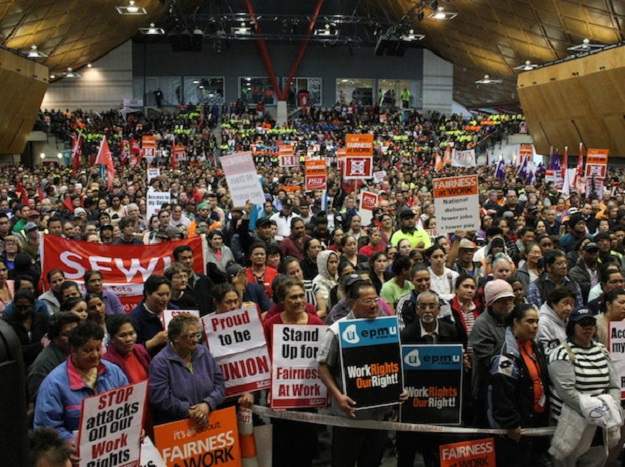Low paid aged care workers at Oceania homes have been driven to revolt. Members of the Service and Food Workers Union Nga Ringa Tota and nurses in the NZNO first struck on 1st March, and again on 7th. Stopwork meetings took place on 14th March and strikes on the 19th and again on 5th April. Staffs at more and more of Oceania’s 57 homes have joined in the action as the campaign has worn on. Joint union spokesperson Alistair Duncan has explained:
“Initially support for industrial action was strongest in Auckland, but commitment to on-going strike action to win this dispute has now spread beyond the metropolitan centres to heartland New Zealand. Workers at smaller rest homes in locations like Pahiatua, Whitianga and Gisborne are standing up and saying enough is enough.”
Oceania homes are run on public money for private profit. Oceania pay their care givers an appalling basic rate of just $13.61, a smidgen above the minimum wage. Qualified nurses are paid more of course, but less than in the public sector. They only get $8.33 on top of basic when they work a weekend shift.
Oceania received a government funding increase in June 2011 but are only offering to pass it to a pay increase to staff from February 2012. Another funding increase due in June this year would be held back from pay until February 2013. In addition to holding back pay rises Oceania has been wanting to cut overtime rates and exclude hundreds of staff from the collective agreement.
As paymasters the government are partners in this crime. Below inflation funding increases, even if they were passed on to pay, keep staff on poverty rates. The unions wrote to Health Minister Tony Ryall asking him to investigate why Oceania had not passed on the public funding, but no response was received.
Workers in caring jobs find it difficult to take action. Strikes that were to take place on 11th and 12th April were cancelled because of worries about residents. As the union explained:
“Both unions gave extended notice of industrial action so Oceania would have plenty of time to make arrangements, but we are becoming increasingly concerned that Oceania has not cared for its residents.”
“We have reports of elderly residents not being fed. We have reports of residents not being showered. We have reports of residents not being cared for, of students being asked to do the work of professionals, of agency staff not responding to residents needs and of non-union cleaning staff being pulled off their duties to do personal cares. None of this is acceptable. While members have endorsed further action, we will put this on hold until we can be sure Oceania residents are being properly supported.”
The industrial power of care workers is limited. The responsibility to stand with them lies with the whole of the working class movement. The SWFU and NZNO should not have to battle on alone. The Council of Trade Unions and all unions should back any future strike actions to the hilt by calling on members to join in public protests in town after town.
The political parties are responsible for the elderly care service being run for profit. As the public pays for the elderly care, why should profit be skimmed off at the expense of poverty pay and minimal standards? Quite simply, Oceania and the other private providers should be nationalised without compensation.
Those false friends of workers, the Labour Party, could make nationalisation a manifesto policy and pledge to make elderly care the quality public service it should be. Keeping the status quo means condemning women care workers to poverty pay indefinitely, because that is what contracted out services are designed for. Only as a public service could women care workers ever get the recognition they deserve for demanding jobs that, let’s face it, few men are emotionally equipped to do.
There is another false friend abroad, and that is the call for New Zealand ownership. Bryan Gould wrote an otherwise excellent piece on the dispute, but lamented that Oceania was Australian-owned (NZH, 14 March 2012).
“Like most overseas owners, Oceania have little knowledge of and even less interest in the welfare of their New Zealand workers – to say nothing of New Zealand customers and taxpayers.”
“The real goal of privatised companies is profit, not service. We cannot prevent privatised firms – despite the government’s obfuscation on this issue – from falling into foreign hands. Enterprises owned overseas have little concern for the interests of their workforce. New Zealand workers are increasingly at the mercy of hard-nosed employers.”
Quite frankly this all-New Zealanders-together nationalism is nonsense. The for-profit elderly care service is a made in New Zealand construct. It operates under New Zealand made anti-union labour laws. There is no evidence at all that New Zealand employers are better to their workers than Australian; in fact it would be easy to make an argument to the contrary. But it is not a question what set of employers have better morals because all capitalists have the same immorality, to exploit and make the most profit possible. The New Zealand ruling class is as greedy as any and gets away with it more than most. The main enemy is at home. The real question Bryan Gould should be asking is how do we build a workers’ movement powerful enough to get rid of the profit system?









